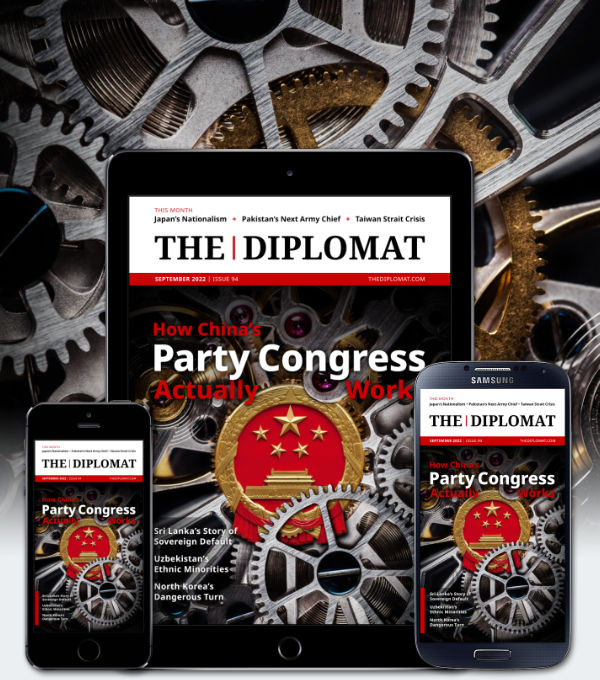| Welcome to the latest issue of Diplomat Brief. This week our top story explores the Rajapaksas’ two-decade dynasty – and the heavy toll it has taken on Sri Lanka. We also have an interview with Nury Turkel, chair of the U.S. Commission on International Religious Freedom, on Uzbekistan’s progress, and remaining problems, regarding freedom of religion. |
| Story of the week |  | Economy Bailouts Won’t Save Sri Lanka. Ending Dynastic Politics Might.What Happened: Many factors contributed to Sri Lanka’s ongoing economic and political crisis, but most of them can be traced back to one common denominator: the two-decade rule of the Rajapaksa clan. Mahinda Rajapaksa ruled Sri Lanka as president from 2005 to 2015; his brother took the helm in 2019 until his ouster. And throughout that time, extended family members – brothers, children, nephews, and in-laws – took plum posts throughout the government bureaucracy. Our Focus: The Rajapaksas’ role in ending Sri Lanka’s devastating civil war gave them near-untouchable political status. They used that to devastating effect: “All said, the Rajapaksa brothers are said to have placed more than 40 relatives in influential positions during their respective tenures as president,” write Debrah Gomes and Vineeth Krishnan of Trivium Think Tank in an analysis for The Diplomat. As a result, the same spending spree that indebted Sri Lanka, leading to its sovereign default earlier this year, enriched the Rajapaksas. “With each new ambitious proposal that was made and with each new ministry or state-run organization helmed by a near-relative, the sovereign debt of Sri Lanka has increased, while the Rajapaksa family coffers kept overflowing. Reports in 2015 suggested that during the two terms of Mahinda’s presidency, over $18 billion was siphoned off by the family.” What Comes Next: There’s a reason Sri Lankan protesters made the family’s ouster from politics a key demand: The public, too, recognizes the role the Rajapaksa family played in the current crisis. Popular protests succeeded in forcing the brothers, one by one, from their posts, culminating in Gotabaya’s resignation and retreat from the country. However, he is now back in Sri Lanka, leading to speculation that the dynasty may be already plotting its return to power. That would be truly devastating for the country, Gomes and Krishnan argue. “It is not loans, aid, or debt restructuring that the island-nation needs the most. A return to grassroots democracy with the coming through of a new crop of leaders is the need of the hour in Sri Lanka.” Read this story |
| Behind the News | INTERVIEW Nury TurkelNury Turkel, chair of USCIRF – an independent, bipartisan commission created to monitor freedom of religion around the world and make policy recommendations to the U.S. government – on why religious freedom in Uzbekistan matters: “A government that stifles religious freedom and other human rights not only violates the rights of its citizens, it also runs the risk of contributing to the very security threats – like violent extremism – that Uzbekistan seeks to contain.” Read the interview |
| This Week in Asia | Northeast Asia A Japan-South Korea Summit in New York?South Korea’s President Yoon Suk-yeol and Japanese Prime Minister Kishida Fumio are both in New York this week to attend the U.N. General Assembly session. Yoon’s office announced last week that he was going to hold what would be his first summit with Kishida – a long-awaited step to help ease tensions in the bilateral relationship. But Japan has refused to confirm plans for the meeting. If Kishida bows out, it would represent another blow to Yoon’s stated hope to repair Japan-South Korea ties. Find out more | South Asia India’s Congress Party Prepares for Leadership ChangeOn September 22, the Indian National Congress is expected to officially announce an upcoming election for the party’s top leadership spot. The poll will be a critical watershed for the Congress, which has lost badly to the BJP in two consecutive general elections. After a slew of resignations, the Congress is desperate to reverse its fortunes – and solving a lingering leadership crisis would be a good first step. Find out more | Southeast Asia Khmer Rouge Tribunal to Hold Final HearingAfter 15 years, $300 million, and convictions against three defendants, the United Nations-backed court that was set up to try surviving leaders of the Khmer Rouge will hold its final hearing this week. Judges at the Extraordinary Chambers in the Courts of Cambodia (ECCC), as it is officially known, will hand down their verdicts in an appeal lodged by Khieu Samphan, 91, the former Khmer Rouge head of state, against his 2018 conviction for genocide. After the hearing wraps, attention will turn to the ECCC’s legacy, and the question of how to balance the court’s undeniable achievements against allegations of corruption and political interference by the Cambodian government. Find out more | Central Asia Violent Escalation of Conflict on the Kyrgyz-Tajik BorderLate last week, as the presidents of Kyrgyzstan and Tajikistan met at the SCO summit in Samarkand, the countries’ border services were fighting along their undemarcated border. More than a skirmish, the latest flash of violence represents a dramatic escalation of the conflict, with officials citing more than 100 deaths, including women and children, and the use of mortars, heavy artillery, and possibly a drone. Find out more |
| Visualizing APAC |  | This 10th century sculpture, housed by the Metropolitan Museum of Art in New York City, is the center of a diplomatic scuffle, with Cambodia claiming the artifact was stolen from an ancient temple before being sold to the Met. See the full picture |
| Word of the Week | Society 社会面清零Shèhuì miàn qīnglíng, Mandarin for “zero social transmission,” the increasingly controversial goal of China’s COVID-19 management policies. Find out more |
|  |




